2017高考专题:短文改错单句练习(从句、代词、动词、多词、非谓语动词)
文档属性
| 名称 | 2017高考专题:短文改错单句练习(从句、代词、动词、多词、非谓语动词) |  | |
| 格式 | zip | ||
| 文件大小 | 61.9KB | ||
| 资源类型 | 教案 | ||
| 版本资源 | 通用版 | ||
| 科目 | 英语 | ||
| 更新时间 | 2019-01-08 18:01:51 | ||
图片预览

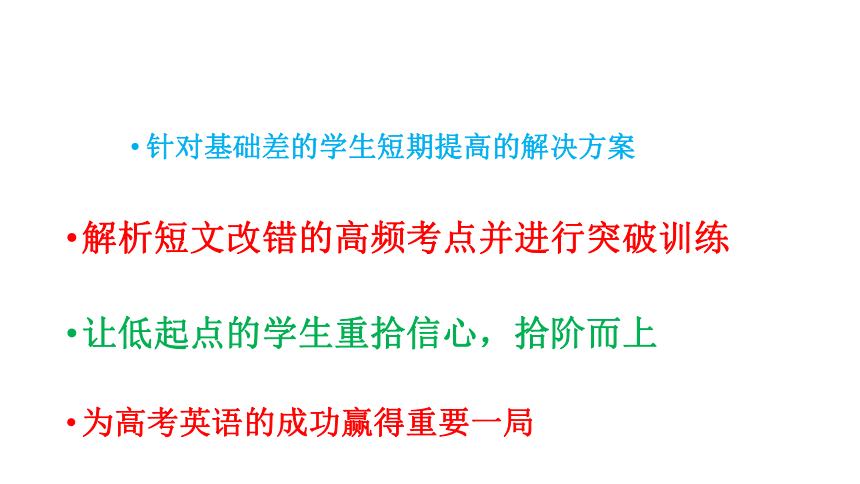
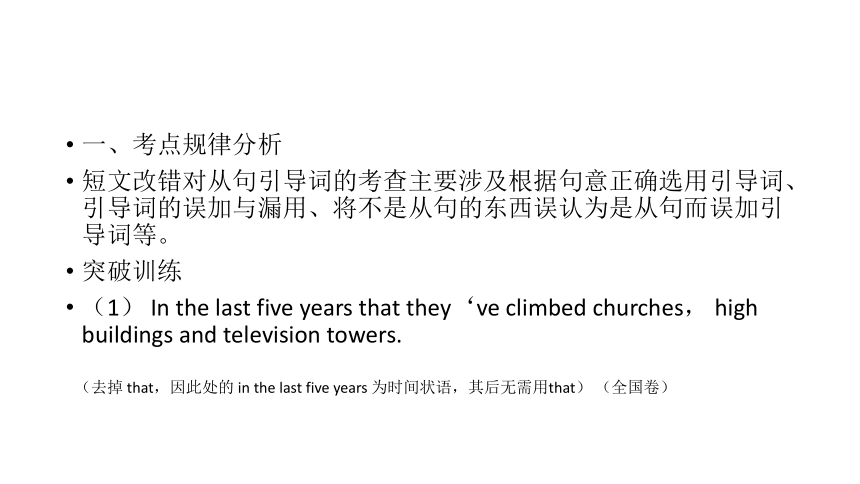
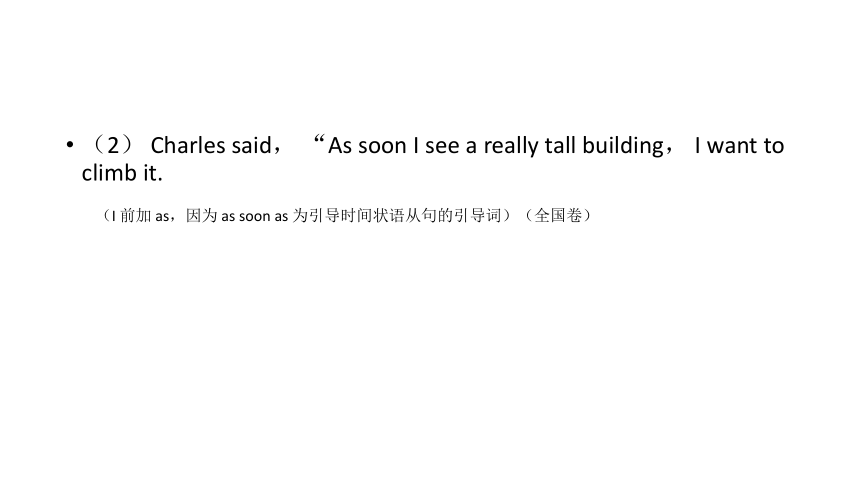
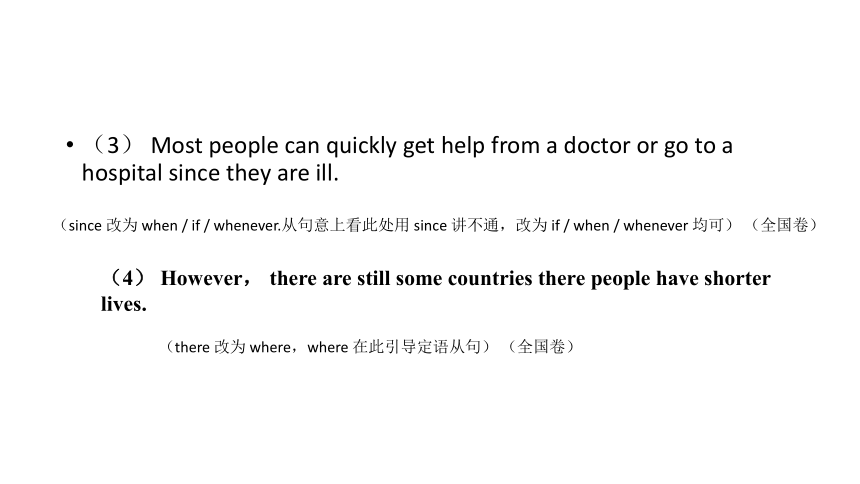
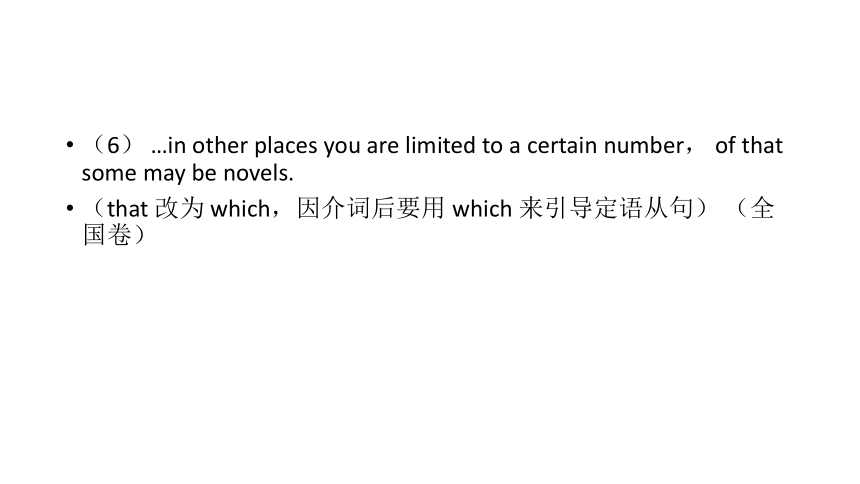
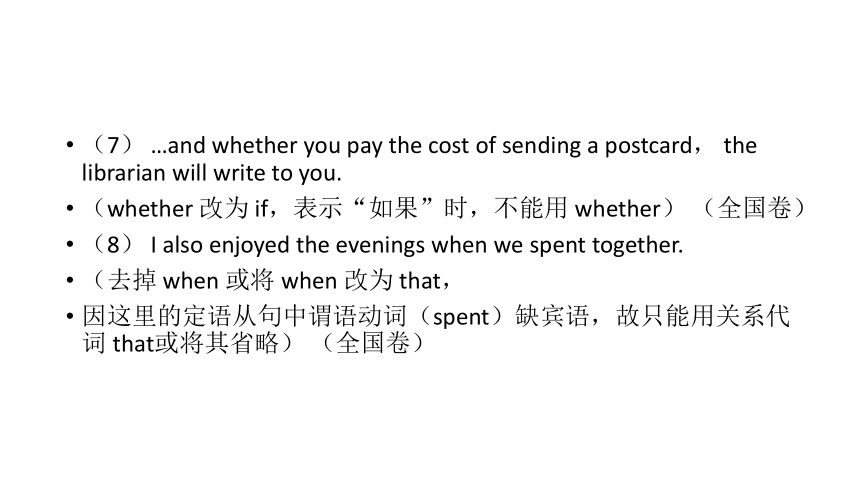
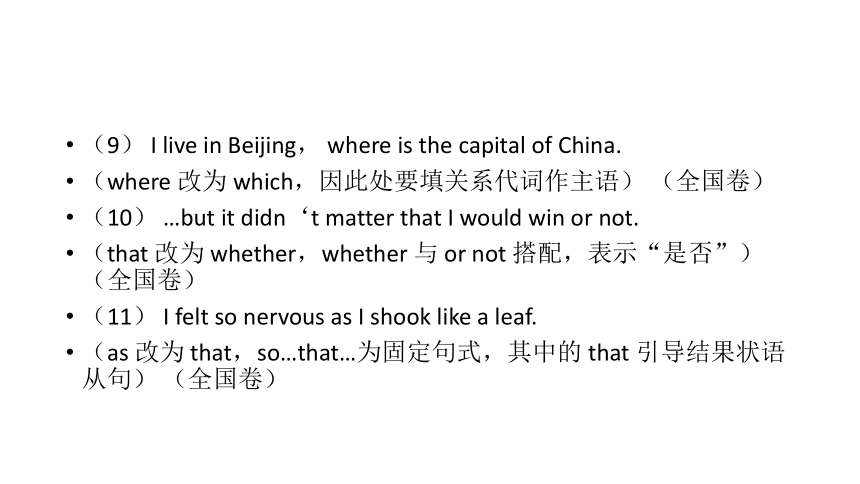
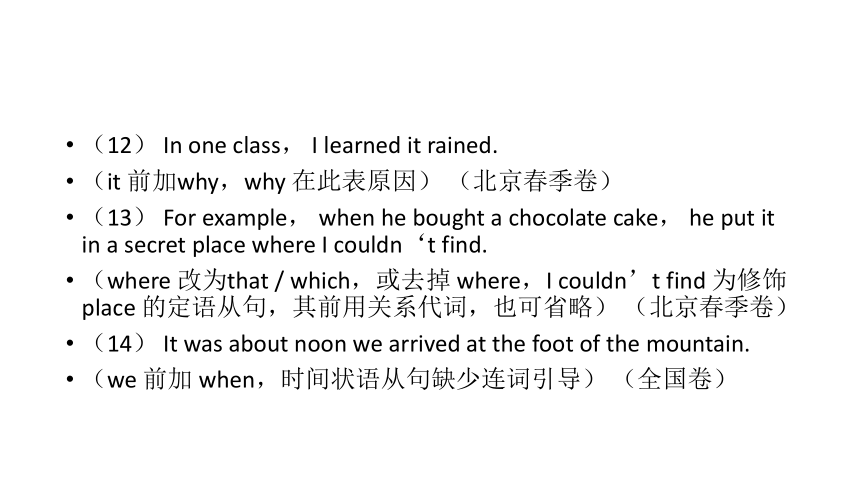
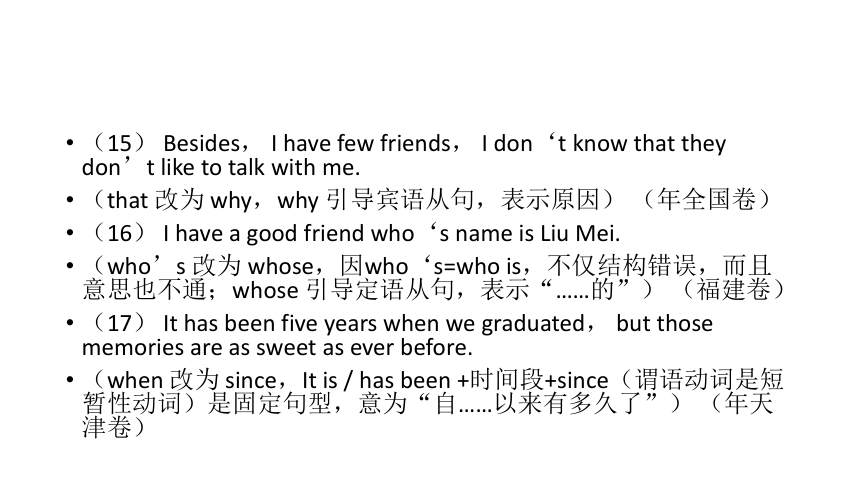
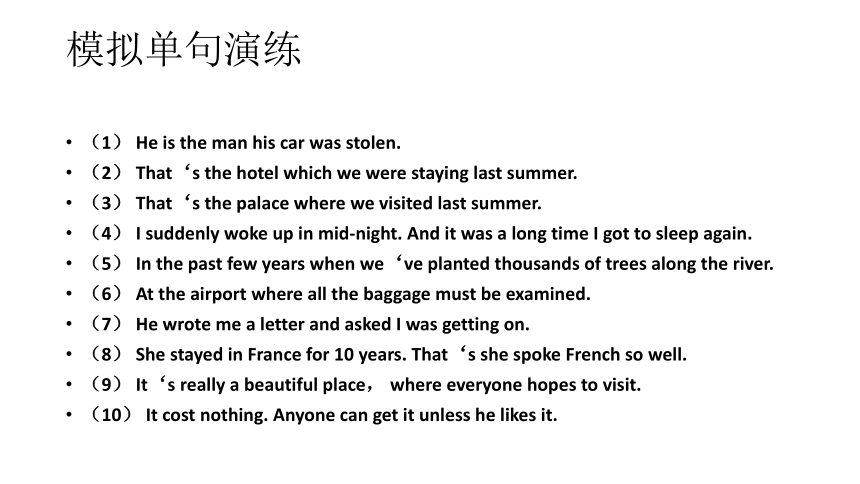
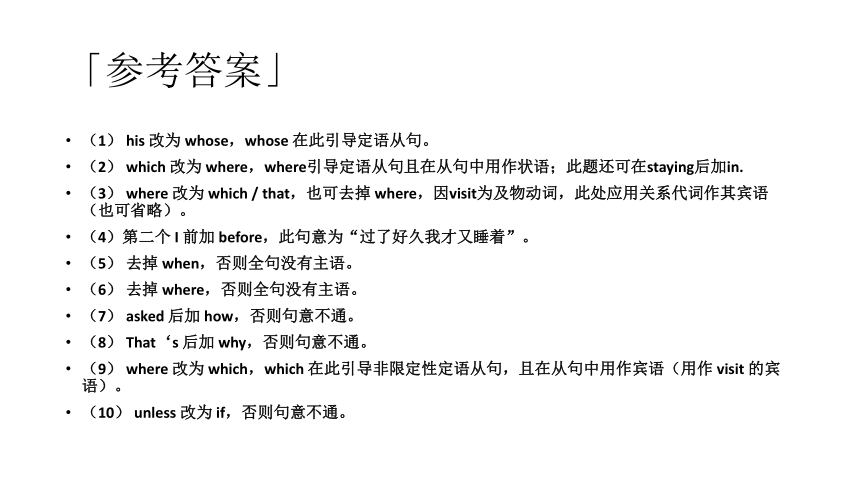
文档简介
课件72张PPT。高考英语短文改错考点突破---从句针对基础差的学生短期提高的解决方案
解析短文改错的高频考点并进行突破训练
让低起点的学生重拾信心,拾阶而上
为高考英语的成功赢得重要一局
一、考点规律分析
短文改错对从句引导词的考查主要涉及根据句意正确选用引导词、引导词的误加与漏用、将不是从句的东西误认为是从句而误加引导词等。
突破训练
(1) In the last five years that they‘ve climbed churches, high buildings and television towers. (去掉 that,因此处的 in the last five years 为时间状语,其后无需用that) (全国卷)(2) Charles said, “As soon I see a really tall building, I want to climb it.
(I 前加 as,因为 as soon as 为引导时间状语从句的引导词)(全国卷)(3) Most people can quickly get help from a doctor or go to a hospital since they are ill.
(since 改为 when / if / whenever.从句意上看此处用 since 讲不通,改为 if / when / whenever 均可) (全国卷)(4) However, there are still some countries there people have shorter lives.(there 改为 where,where 在此引导定语从句) (全国卷)(6) …in other places you are limited to a certain number, of that some may be novels.
(that 改为 which,因介词后要用 which 来引导定语从句) (全国卷)(7) …and whether you pay the cost of sending a postcard, the librarian will write to you.
(whether 改为 if,表示“如果”时,不能用 whether) (全国卷)
(8) I also enjoyed the evenings when we spent together.
(去掉 when 或将 when 改为 that,
因这里的定语从句中谓语动词(spent)缺宾语,故只能用关系代词 that或将其省略) (全国卷)(9) I live in Beijing, where is the capital of China.
(where 改为 which,因此处要填关系代词作主语) (全国卷)
(10) …but it didn‘t matter that I would win or not.
(that 改为 whether,whether 与 or not 搭配,表示“是否”) (全国卷)
(11) I felt so nervous as I shook like a leaf.
(as 改为 that,so…that…为固定句式,其中的 that 引导结果状语从句) (全国卷)(12) In one class, I learned it rained.
(it 前加why,why 在此表原因) (北京春季卷)
(13) For example, when he bought a chocolate cake, he put it in a secret place where I couldn‘t find.
(where 改为that / which,或去掉 where,I couldn’t find 为修饰 place 的定语从句,其前用关系代词,也可省略) (北京春季卷)
(14) It was about noon we arrived at the foot of the mountain.
(we 前加 when,时间状语从句缺少连词引导) (全国卷)(15) Besides, I have few friends, I don‘t know that they don’t like to talk with me.
(that 改为 why,why 引导宾语从句,表示原因) (年全国卷)
(16) I have a good friend who‘s name is Liu Mei.
(who’s 改为 whose,因who‘s=who is,不仅结构错误,而且意思也不通;whose 引导定语从句,表示“……的”) (福建卷)
(17) It has been five years when we graduated, but those memories are as sweet as ever before.
(when 改为 since,It is / has been +时间段+since(谓语动词是短暂性动词)是固定句型,意为“自……以来有多久了”) (年天津卷) 模拟单句演练 (1) He is the man his car was stolen.
(2) That‘s the hotel which we were staying last summer.
(3) That‘s the palace where we visited last summer.
(4) I suddenly woke up in mid-night. And it was a long time I got to sleep again.
(5) In the past few years when we‘ve planted thousands of trees along the river.
(6) At the airport where all the baggage must be examined.
(7) He wrote me a letter and asked I was getting on.
(8) She stayed in France for 10 years. That‘s she spoke French so well.
(9) It‘s really a beautiful place, where everyone hopes to visit.
(10) It cost nothing. Anyone can get it unless he likes it.「参考答案」(1) his 改为 whose,whose 在此引导定语从句。
(2) which 改为 where,where引导定语从句且在从句中用作状语;此题还可在staying后加in.
(3) where 改为 which / that,也可去掉 where,因visit为及物动词,此处应用关系代词作其宾语(也可省略)。
(4)第二个 I 前加 before,此句意为“过了好久我才又睡着”。
(5) 去掉 when,否则全句没有主语。
(6) 去掉 where,否则全句没有主语。
(7) asked 后加 how,否则句意不通。
(8) That‘s 后加 why,否则句意不通。
(9) where 改为 which,which 在此引导非限定性定语从句,且在从句中用作宾语(用作 visit 的宾语)。
(10) unless 改为 if,否则句意不通。 并列连词短文改错对并列连词的考查主要涉及and, but, or, so 等几个表示并列、转折、选择、因果等关系的词语。严格说来,这类错误主要属于行文逻辑的错误。
二、真题单句归纳(1) We tried to fix it and there was nothing we could do. (and 改为 but,因此处语意转折) (全国卷)
(2) I told Mother, Father, Sister, all my friends here what a great time I had.
(all 前加 and,表示并列关系) (全国卷)
(3) It is a very important exam but I can‘t afford to fail it.
(but 改为 and / so,此处表因果关系,并非转折关系) (北京春季卷)(4) She was smiling but nodding at me.
(but 改为 and,因此处并无转折之意) (全国卷)
(5) It looks as if my parents treat me as a visitor and a guest.
(and 改为 or,a visitor 和 a guest 应是选择关系,意思是“好像我的父母亲把我当作一个来访者或一个客人”)
(6) The food was expensive and the service was good. (and 改为 but,此处意义发生转折) (全国卷)(7) I‘m the captain of our school team so with my fellow players we’ve won several games.
(so 改为 and,表并列关系) (安徽春季卷)
(8) My grandma was the best cook in the world but could make the most delicious dishes.
(but 改为and,此处表示并列,而不是转折) (江苏卷)
(9) So once you‘ve started collecting seriously, you… (So 改为 But,因为前后是转折关系) (年浙江卷)(10) Clever as she is, but she works very hard.
(去掉but,因前面已有引导让步状语从句的连词 as(=though 虽然),千万不要受汉语句式“虽然……但是……”的影响,而重复用连词) (福建卷)
(11) I teach them, play with them, but watch them growing up.
(but 改为and,因为 teach / play 与 watch 是并列关系,而不是转折关系) (湖北卷)模拟单句演练
(1) Do you want a bath at once, and shall I have mine first?
(2) Are you going to clean your car before and after supper?
(3) Hurry up, and you‘ll be late for school.
(4) She never said she was rich, and she was.
(5) Mr Smith worked very hard so without any success.
(6) Everyone asked me to go, but I went.「参考答案」
(1) and 改为 or,or 在此表选择。
(2) and 改为 or,or 在此表选择。
(3) and 改为 or,or 在此表示“要不然”、“否则”。
(4) and 改为 but,but 在此表示转折。句中的 she was 为 she was rich 之省略。
(5) so 改为 but,此处语意转折。
(6) but 改为 so,so 在此表示因果关系高考英语短文改错考点解析-代词
一、考点规律分析
短文改错对代词的考查主要涉及人称代词的前后一致性(包括指代的一致性和单复数的一致性)、人称代词的主格与宾语变化、各类代词的误加与漏用(尤其是一些易受汉语影响的结构)、某些不定代词的用法(尤其是在意思上用错)、代词在某些习语中的用法等。二、真题单句归纳 (1) David pointed to a path which it he thought would probably lead to a village.
(2) When we walked to the car, Bill smiled and shook head.
(3) We climb everywhere, not only in America. They have been to Europe many times.
(4) And I can‘t forget the good food you cooked for I.
(5) I hope that both you two could come and visit us some time soon. (6) The Smiths did his best to make me feel at home.
(7) And they must not break the rules too often if we want to win the game.
(9) Now someone at home reads instead. (someone 改为 everyone 或 everybody.从全文语义来看,应为“每一个人”) (全国卷)
(10) I‘m spend all the whole weekend reading and preparing for it. (11) The day before the speech contest(比赛) English teacher talked to me.
(12) I think I liked those classes because I felt that it helped me understand what the world works. (
(13) …in any other words, I am an only child.
(14) For example, when he bought a chocolate cake, he put them in a secret place I couldn‘t find.
(15) Then he ate it all, by himself. He never helped other. (16) The three of them were very excited. (them 改为 us,因短文用的是第一人称) (全国卷)
(17) But his parents think going to college is more important than playing sports and college is the only place for a smart boy like his son. (18) According to studies, any children spend more time watching television than they spend in school.
(19) …and tried to translate anything into English. (anything 改为 everything,根据上下文句意确定) (全国卷)
(20) …as I was learning to express me in simple English. (21) One day I wrote a little story and showed to my teacher. )
(21) At once I apologized and controlled me at my best till the dinner started. (me 改为 myself,根据主语和句意,此处应用反身代词) (江苏卷)
(22) And every year more and more people start a stamp collection of your own (
(23) If any one of us had any difficulty in our life or study, the other would help him out.
(24) What‘s more, you have to be friendly with your pupils and take good care of him. 三、模拟单句演练(1) Here are some letters for you and he.
(2) She loves swimming. It keeps she fit.
(3) Here are the cats Auntie brought us. Take good care of it.
(4) Everyone here gets up earlier than her does.
(5) Here is my dog. It‘s name is Petty.
(6) He opened mouth as if to say something.
(7) Don‘t lose your heart. Try again.
(8) The Smiths have been married, but have no children of his own.
(9) I tell him everything, for he is a good friend of me.
(10) He smiled at her and laid her hand on hers.「参考答案」
(1) he 改为 him,因与you并列用作介词 for 的宾语。
(2) she 改为 her,因用作动词 keeps 的宾语。
(3) it 改为 them,因它指代前面的cats.
(4) her 改为 she,因其后有动词 does.
(5) It‘s 改为 Its,it’s = it is / it has,而 its 意为“它的”。
(6) mouth 前加his,按英语习惯,此物主代词不能少。
(7) 去掉 your,比较:lose heart意为灰心,lose one‘s heart意为爱上。
(8) his 改为 their,因其前相应的名词 the Smiths(史密斯夫妇)表复数。(11) When you are away from home, you should look after you.
(12) If you have any question, put up hand.
(13) It‘s a very important thing. You must think over carefully.
(14) I don‘t like these; please show me some other.
(15) In order to catch the thief, the police did his best.
(16) This is the book which you bought it for me ten years ago.
(17) I‘m very sorry about all the whole thing.
(18) When I got up, I found parents were preparing breakfast for me.
(19) Yes, money is very important, but it is not anything.
(20) At the airport, all his baggage was stolen, but soon he got them back.(9) me 改为 mine,a friend of 后习惯上名词性物主代词,不接人称代词的宾格形式。
(10) 将 her hand 中的 her 改为 his,句意为“他对她笑了笑,把他的手放在她手上”。
(11) 将最后一个 you 改为 yourself,look after oneself 意为“自己照顾自己”。
(12) hand 前加 your,否则不合英语习惯。
(13) think 后加 it,因 think over 为及物动词。
(14) other 改为 others,指另外的一些;若指另外的一个,可用 another.
(15) his 改为 their,指代前面的 the police(它永远表复数意义)。
(16) 去掉 it,因 it 与 which 语义重复。
(17) 去掉 all,因它与 the whole 语义重复。
(18) parents 前加 my,否则不符合英语习惯。
(19) anything 改为 everything,否则语意不通。
(20) them 改为 it,因 baggage 为不可数名词
高考英语短文改错考点解析-动词
一、动词考点规律分析
动词考点归纳的是除动词时态与非谓语动词之外的动词考点,它包括被动语态、情态动词、动词形式的变化、动词用法辨析、动词 be 的误加与漏用等。(1) He lied down by the side of the path to rest.
(lied 改为 lay,lie 表示“躺”时,其过去时是 lay) (全国卷)
(2) Charles and Linda were seeing near the top of the building. (seeing 改为 seen,因为从含义上看,此处谓语应用被动语态) (全国卷)
(3) Books may be keep for four weeks.
(keep 改为 kept,因此处要用被动语态) (全国卷)(4) …and let you know when the book you want has returned. (returned 之前加 been,因从句意上看,此处要用被动语态) (全国卷)
(5) Uncle Ben will also go back for Christmas.
(go 改为 come,由句意可知) (全国卷)
(6) They eager to know everything about China and asked me lots of questions.
(eager 前加were,因此处缺谓语动词) (全国卷)(7) I‘d like to your pen-friend, and get to know more about your country.
(to 后加 be / become,因 would like后要接不定式,根据句意此处应加 be / become) (全国卷)
(8) What your favourite sport?
(what 后加 is 或将 What 改为 What‘s,此句缺谓语) (全国卷)
(9) I use to play ping-pong a lot in my spare time, but now I am interested in football.
(use to 改为 used to,此为习语,意为“过去经常”) (全国卷)(10) I was used to watch it every night.
(去掉 was,因 used to do sth 是固定表达,意为“过去常常做……”) (全国卷)
(11) There will an important game next month.
(will 后加be,此处缺谓语动词) (安徽春季卷)
(12) Because of so much viewing, children may not be develop the habit of reading and the ability to enjoy themselves.
(去掉 be,因它与其后的动词 develop 相冲突) (北京春季卷)(13) I followed her advice and should put down 100 words or so each day.
(去掉 should,因 put 和 followed 是平行结构,作并列谓语) (14) As we were all left home? at an early age.
(去掉were,因句中已有谓语动词left,
(15) I often dream of a teacher.
(a teacher 前加上 being 或 becoming.
(16) Without enough knowledge,?? you can never learn well.(learn改为teach,因上句讲“为了教好,教师不得不学”,此句便是“没有学问,就决不会教好”) (年湖北卷) 三、模拟单句演练 (1) I want to know how long the book can be keep.
(2) Don‘t worry. Your child is well looking after here.
(3) All the invitations must sent out today.
(4) You are an expert on this. You might invited to speak at the meeting.
(5) The public have a right to know what in the report.
(6) What the English for this? Can anyone tell me?
(7) He says that he likes singing and that he wants to a singer.(8) He is a nice girl. You‘re certain to happy with her.
(9) I use to play tennis a lot but I don‘t play very often now.
(10) He has changed a lot. He is not what he was used to be.
(11) It was very cold. The snow lied thick on the ground.
(12) There will have an English film in the school hall tonight.
(13) After that, the boy decided not to a sailor.
(14) After supper, my father would go out for a walk and then come back to see newspapers.
(15) Hear to me carefully. What I‘m saying is very important. 「参考答案」
(1) keep 改为 kept,根据句意,此处应用被动语态。
(2) looking 改为 looked,根据句意,此处应用被动语态。
(3) sent 前加 be,根据句意,此处应用被动语态。
(4) invited 前加 be,根据句意,此处应用被动语态。
(5) what 后加 is 或 将 what 改为 what‘s,因此句缺谓语动词。
(6) What 后加 is 或 将 What 改为 What‘s,因此句缺谓语动词。
(7) to 后加 be或be come,其意为“成为”。
(8) to 后加 be,happy 用作 to be 的表语。
(9) use 改为 used,used to 意为“过去经常”。
(10) 去掉 was,used to 表示今昔对比,be used to 表示“习惯于”。
(11) lied 改为 lay,lie 表示“说谎”时,是规则动词;表示“躺”、“保持”等,是不及物规则动词,其过去式和过去分词为 lay, lain.
(12) have 改为 be,为 there be 的将来时态。
(13) to 后加 be / become,否则意思不完整。
(14) see 改为 read,“看报”习惯上用动词 read.
(15) Hear 改为 Listen.listen to 表示注意听,侧重过程;hear 表示听见,侧重结果
高考英语短文改错考点解析-多词
一、考点规律分析
多词错误主要涉及英语中一些“小”词,如冠词、介词、不定式符号、人称代词、动词 be、比较级more等。具体说来,多词错误可能涉及的问题有:及物动词后接宾语时误加介词,在该用动词原形的地方误加不定式符号to,在物质名词、抽象名词、复数名词等表示泛指时误加定冠词,在一些可直接用作状语的短语前误加介词in, on, for 等,误加一些导致语义重复的小词(如two 与both连用,all 与whole 连用等),在本身已是比较级的词前误加more,在不是从句的地方误加从句“引导词”,在一些习惯用语和固定表达中误加不该用的“小词”(如冠词、介词、副词等),等等。二、真题单句归纳 (1) David pointed to a path which it he thought would probably lead to a village.
(去掉 it,因它与其前的关系代词 which 语义重复) (全国卷)
(2) Some people read the books or watch television while others have sports.
(去掉 the,因这里的 books 表泛指,不表特指) (全国卷)
(3) In the last five years that they‘ve climbed churches, high buildings and television towers.
(去掉 that,因此处的 in the last five years 为时间状语,其后无需用that) (全国卷)(4) Modern people know more about the health, have better food, and live in clearer surroundings.
(去掉 the,因health 表泛指) (全国卷)
(5) Most people can quickly get for help from a doctor or go to a hospital when they are ill.
(去掉 for,因其前的 get 是及物动词) (全国卷)
(6) Modern people know more about health, have better food, and to live in clearer surroundings.
(去掉live 前的 to,因为 live 与其前的 know, have 并列) (全国卷)(7) As a result, people in the modern world generally live much more longer than people in the past.
(去掉 more,因为 longer 本身已是比较级,不能再受 more 修饰) (全国卷)
(8) …and let you to know when the book you want has returned (去掉 know 前的 to,因为其前有动词 let) (全国卷)
(9) …in other places where you are limited to a certain number, of that some may be novels.
(去掉 where,in other places 在此为地点状语) (全国卷)(10) If the book you will want is out, you may ask for it to be called back for you.
(去掉 will) (全国卷)
(11) I never knew about a ride down a river could be so exciting. (去掉 about 或将 about 改为 that,因动词 knew 后可直接跟宾语从句,无需用介词) (全国卷)
(12) I never knew a ride down a river could be so much exciting. (去掉 much,因 much 不能用来修饰形容词的原级,尽管它可用来修饰形容词的比较级和最高级) (全国卷)(13) I also enjoyed the evenings when we spent together.
(去掉 when 或将 when 改为 that,因这里的定语从句中的谓语动词(spent)缺宾语,故只能用关系代词 that或将其省略) (全国卷)
(14) I hope that both you two could come and visit us some time soon.
(去掉 both.因 both 与后面的 two 意义重复,
(15) Today I visited the Smiths — my first time visit to an American family.
(去掉time,因first 已含有“次”的意思) (全国卷)(16) In fact, they are planning to visit China in next year.
(去掉 in,在由 next, this, last 等词构成的时间短语中,一般可直接用作时间状语,无需加 in, on, at 这样的介词) (全国卷)
(17) First, let me tell you something more about myself.
(去掉 more,因从上下文看,这是第一次给对方给信,不存在谈谈“更多情况”的问题) (全国卷)
(18) We practise for three times every week.
(去掉 for,在表示频率的名词前通常不加介词) (全国卷)(19) Now I can‘t watch much television, but a few years ago…
(去掉 much,因为从下文看作者现在根本就不看电视) (全国卷)
(20) I was used to watch it every night.
(去掉 was,因 used to do sth 是固定表达,意为“过去常常做……”) (全国卷)
(21) I‘ll spend all the whole weekend reading and preparing for it. (去掉 all,因 all 与 whole 语义重复) (北京春季卷)
(22) So I‘m really sorry that I won’t be able to come in this time.
(去掉 in,因 this time 可直接用时间作状语) (北京春季卷)(23) Suddenly, I caught a sight of my English teacher in the crowd.
(去掉 a,catch sight of是习语,意为“看见、瞥见”) (全国卷)
(24) Whenever I see them I will often think of my English teacher.
(去掉 often,因句中的whenever 与 often 意义重复) (全国卷)
(25) For example, when I was a child, the rain was a mystery(奥秘)。
(去掉 the,rain 在此表泛指) (北京春季卷)
(26) …in any other words, I am an only child.
(去掉 any,因 in other words 为固定短语,意思是“换句话说”) (全国卷)
(27) …but we do not seem to get much time to talk about together.
(去掉 about,因 about 后没有宾语,about 属多余) (全国卷)
(28) For example, when he bought a chocolate cake, he put it in a secret place where I couldn‘t find.
(where 改为that / which,或去掉 where,I couldn’t find 为修饰 place 的定语从句,其前用关系代词,也可省略) (北京春季卷)(29) For instance, on one night he played strong and loud music till four o‘clock in the morning.
(去掉 on,因 one night 可直接用作时间状语) (北京春季卷)
(30) The time passes quickly. Evening came down.
(去掉 down,要表示“夜幕降临”,直接说 Evening came 即可) (全国卷)
(31) I was so tired that I fell asleep at the moment my head touched the pillow.
(去掉 at,the moment 在此用作连词,相当于 as soon as) (全国卷)(32) His parents asked him to spend in more time preparing for the college entrance examination.
(去掉 in,spend 是及物动词,其后可直接跟名词作宾语) (安徽春季卷)
(33) Because of so much viewing, children may not be develop the habit of reading and the ability to enjoy themselves.
(去掉 be,因它与其后的动词 develop 相冲突) (北京春季卷)
(34) …to make children to want things that they don‘t really need.
(去掉 want 前的 to,因为 want…在此用作使役动词 make 的宾语补足语) (年北京春季卷)(35) The main problem was in that I always thought in Chinese… (去掉 in,was 后是一个由 that 引导的宾语从句,in 是多余的) (全国卷)
(36) I followed her advice and should put down 100 words or so each day.
(去掉 should,因 put 和 followed 是平行结构,作并列谓语) (全国卷)
(37) When I was a boy, the most exciting thing was when to celebrate the Spring Festival.
(去掉 when,根据句意,此处无需加疑问词) (江苏卷)(39) Can you tell me about what I should do?
(去掉 about,tell sb后面直接跟从句) (全国卷)
(40) …you will probably want to join in the Stamp Collectors‘ Club…
(去掉in.表示“参加,加入”某个组织, join 后不要再加介词in;表示“参加”某项活动时,才加 in) (浙江卷)
(41) Clever as she is, but she works very hard.
(去掉but,因前面已有引导让步状语从句的连词as(=though虽然)。不要受汉语句式“虽然……但是……”的影响,而重复用连词) (福建卷)(42) I still remember my middle school life in Tianjin yet.
(去掉yet,表示“还、仍然”的yet通常用于疑问句或否定句中;在肯定句中用still.而且前面又已经有still了) (天津卷)
(43) Though I am a student now, I will work as very hard to make my dream come true.??
(去掉 as,根据句意 as 属多余) (湖北卷)
(44) On Thursday I will have to decide what I want myself to do over the weekend.
(去掉 myself,表示主语自己想做某事,用 want to do sth;若是表主语想要别的人做某事,用want sb to do sth) (四川卷) 高考英语短文改错考点解析-非谓语动词
一、考点规律分析
短文改错对非谓语动词的考查主要涉及不定式符号 to 的有无,介词后该使用动词的什么形式(用动名词),并列结构中几个非谓语动词是否一致,动词用作主语时用何种形式(可用动名词或不定式,但不能用动词原形)等。二、真题单句归纳 (1) David and I wanted go off to find help but Bill insisted on staying near the car.
(wanted 后加 to,因为want 后要接不定式) (全国卷)
(2) …rather than go into the forest and getting lost.
(getting 改 get,因为 get 与其前的go 并列) (全国卷)
(3) David pointed to a path which he thought would probably leading to a village.
(leading 改为 lead,因为其前有助动词 would) (全国卷)
(4) I went back to get David and helped him to stood up.
(stood 改为 stand,因为 to stand up 在此为不定式结构) (全国卷)(5) Charles and Linda Mason do all of these things as well as climbed building.
(climbed 改为 climb / climbing,若将 as well as 视为连词,则将 climbed 改为 climb,因为它与其前的 do 并列;若将 as well as 视为介词,则 climbing,因为介词后动词用动名词) (全国卷)
(7) The World Health Organization and?? other organizations are working improve health all over the?? world.
(improve前加to,to improve…为表目的的不定式短语) (全国卷)
(8) …you pay the cost of send a postcard, the librarian will write to you.
(send改为sending,因为介词后接动名词作宾语) (全国卷)(9) …and let you to know when the book you want has returned (去掉 know 前的 to,因为其前有动词 let) (全国卷)
(10) I want to thank you again for have me in your home for the summer holidays.
(have改为having,因为介词后接动名词作宾语) (全国卷)
(11) I had always wanted return to the village after moving away. (return前加 to,因为 want 后要接不定式) (全国卷)
(12) It was very kind of them to meet me at the railway station and drove me to their home.
(drove改为 drive,因为 drive 与其前的 to meet 并列,此处的 drive 为省略 to 的不定式) (全国卷)(13) I look forward to hear from you soon.
(hear改为 hearing,因为其前的 to 是介词) (全国卷)
(14) Play football not only makes us grow up tall and strong but also gives us a sense of fair play and team spirit.
(第一个play改为 playing,因为动词原形不能用作主语) (全国卷)
(15) I was often a little tired after a day‘s work and watch TV demands very little effort.
(watch改为 watching,因为动词原形不能用作主语) (全国卷)
(16) I‘d like very much come but I have an examination on Monday morning.
(come 前加 to,因为 would like 后接不定式) (北京春季卷)(17) I‘ll spend the whole weekend reading and prepare for it. (prepare 改为 preparing,因为它与其前的 reading 并列,与其前所用的动词 spend 有关) (北京春季卷)
(18) But then there is always more mysteries look into.
(look 前加 to,此处为不定式作后置定语) (北京春季卷)
(19) After learn the basics of the subject, nothing else seemed very practical to me.
(learn 改为learning,因为介词后接动名词作宾语)
(20) My parents love me dearly of course and will do all they can make sure that I get a good education. (
make 前加 to,因为 to make… 在此用作目的状语,注意句型 do all one can to do sth) (全国卷)
(21) He did not want share things with other people.
(want 后加 to,因为want 后要接不定式) (北京春季卷)
(22) That is, a game of tennis making him very busy.
(making 改为made,因为缺谓语,不能用非谓语形式,根据上下文用一般过去时) (北京春季卷)
(23) As we climbed the mountain, we fed monkeys, visiting temples and told stories.
(visiting 改为 visited,因为它与其前的 fed 和其后的 told 并列) (全国卷)(24) But his parents think go to college is more important than playing sports.
(go 改为 going,因为动词原形不能用作主语) (安徽春季卷)
(25) …children may not develop the habit of read and the ability to enjoy themselves.
(read 改为 reading,因为介词后要接动名词) (年北京春季卷)
(26) …to make children to want things that they don‘t really need.
(去掉 want 前的 to,因为 want…在此用作使役动词 make 的宾语
(27) Soon I began to enjoy talk to myself on paper as I was learning to express myself in simple English.
(talk 改为 talking,因为动词 enjoy 后要接动名词作宾语) (全国卷)(28) Shake her head, she said, “It isn‘t a good time to do that, dear.”
(Shake 改为 Shaking,现在分词表伴随) (江苏卷)
(29) It‘s like going to a huge library without have to walk around to find your books.
(have 改为 having,介词后用动名词作宾语) (广西卷)
(30) I am thinking of making a trip to London, and visit the British Museum and some parks.
(visit 改为 visiting,因visit与making并列,作介词of的宾语) (31) I have some records giving to me as birthday gifts.
(giving 改为 given,“把某物给某人”是give sth to sb;句中records与give是被动关系,故用过去分词)
I dream of standing on the platform in the classroom and give lessons to lovely boys and girls.
(give改为giving,因它与standing并列,作dream of的宾语)三、模拟单句演练 (1) In those days we were forced work twelve hours a day.
(2) It‘s very difficult for a foreigner learn Chinese.
(3) It was silly of you believe what he said.
(4) He was made wash the boss‘s car once a day.
(5) I‘ll let you to know as soon as I hear from her.
(6) I waved to her but failed attract her attention.
(7) I have already seen the film twice. I don‘t want see it any more.
(8) What I want know is when all this happened.
(9) It was clear that he wanted be alone.
(10) Most children are interested in listen to stories.(11) Walk quickly is difficult for an old man.
(13) Be careful in cross the street.
(14) The film is very interesting. It is worth see twice.
(15) Find work is very difficult these days.
(16) Most of us students enjoy ask questions in English.
(17) Look, some of my classmates are practising speak English over there.
(18) Teach a child to sing and dance is very interesting.(19) Learn to speak English is more difficult than to write it.
(20) My friend Jim is very good at making things and repair things.
(21) He decided to go to the south, find a good job and living there.
(22) It was very kind of you to buy us so much fruit and seeing us at the station.
(23) Excuse me, would you to tell me the way to the zoo?「参考答案」
(1) work 前加 to,此句为 force sb to do sth 的被动形式。
(2) learn 前加 to,此句用的是 it‘s difficult for sb to do sth 句型。
(3) believe 前加 to,此句用的是 it‘s silly of sb to do sth 句型。
(4) wash 前加 to,make sb do sth 中的 do 不能带to,但若 make 用于被动语态,则其后的 do 要带 to.
(5) 去掉 to,因为 let 后用作宾语补足语的不定式不能带 to.
(6) attract 前加 to,fail to do sth 意为“未能做某事”。
(7) see 前加 to,want(想要)后接动词要用不定式。
(8) know 前加 to,want(想要)后接动词要用不定式。
(9) be 前加 to,want(想要)后接动词要用不定式。
(10) listen 改为 listening,介词后接动名词作宾语。(12) Walk 改为 Walking,用作主语要用动名词,不用动词原形。注意不能将 walk 视为名词,因为其后有副词修饰语 quickly.
(13) cross 改为 crossing,介词后接动名词作宾语。
(14) see 改为 seeing,worth 后接动词要用动名词形式。
(15) Find 改为 Finding,用作主语要用动名词,不用动词原形。
(16) ask 改为 asking,enjoy 后接动词作宾语要用动名词形式。
(17) speak 改为 speaking,practise 后接动词作宾语要用动名词形式。
(18) Teach 改为 Teaching,用作主语要用动名词,不用动词原形。
((19) Learn 改为 Learning,用作主语要用动名词,不用动词原形。
(20) repair 改为 repairing,因它与 making 并列,一起用作介词 at 的宾语。
(21) living 改为 live,因它与其前的 go to…, find… 并列。
(22) seeing 改为 see,因它与 to buy 并列,see 为省略 to 的不定式。
(23) 去掉 tell 前的 to,因 would you… 后应接动词原形,不接不定式
解析短文改错的高频考点并进行突破训练
让低起点的学生重拾信心,拾阶而上
为高考英语的成功赢得重要一局
一、考点规律分析
短文改错对从句引导词的考查主要涉及根据句意正确选用引导词、引导词的误加与漏用、将不是从句的东西误认为是从句而误加引导词等。
突破训练
(1) In the last five years that they‘ve climbed churches, high buildings and television towers. (去掉 that,因此处的 in the last five years 为时间状语,其后无需用that) (全国卷)(2) Charles said, “As soon I see a really tall building, I want to climb it.
(I 前加 as,因为 as soon as 为引导时间状语从句的引导词)(全国卷)(3) Most people can quickly get help from a doctor or go to a hospital since they are ill.
(since 改为 when / if / whenever.从句意上看此处用 since 讲不通,改为 if / when / whenever 均可) (全国卷)(4) However, there are still some countries there people have shorter lives.(there 改为 where,where 在此引导定语从句) (全国卷)(6) …in other places you are limited to a certain number, of that some may be novels.
(that 改为 which,因介词后要用 which 来引导定语从句) (全国卷)(7) …and whether you pay the cost of sending a postcard, the librarian will write to you.
(whether 改为 if,表示“如果”时,不能用 whether) (全国卷)
(8) I also enjoyed the evenings when we spent together.
(去掉 when 或将 when 改为 that,
因这里的定语从句中谓语动词(spent)缺宾语,故只能用关系代词 that或将其省略) (全国卷)(9) I live in Beijing, where is the capital of China.
(where 改为 which,因此处要填关系代词作主语) (全国卷)
(10) …but it didn‘t matter that I would win or not.
(that 改为 whether,whether 与 or not 搭配,表示“是否”) (全国卷)
(11) I felt so nervous as I shook like a leaf.
(as 改为 that,so…that…为固定句式,其中的 that 引导结果状语从句) (全国卷)(12) In one class, I learned it rained.
(it 前加why,why 在此表原因) (北京春季卷)
(13) For example, when he bought a chocolate cake, he put it in a secret place where I couldn‘t find.
(where 改为that / which,或去掉 where,I couldn’t find 为修饰 place 的定语从句,其前用关系代词,也可省略) (北京春季卷)
(14) It was about noon we arrived at the foot of the mountain.
(we 前加 when,时间状语从句缺少连词引导) (全国卷)(15) Besides, I have few friends, I don‘t know that they don’t like to talk with me.
(that 改为 why,why 引导宾语从句,表示原因) (年全国卷)
(16) I have a good friend who‘s name is Liu Mei.
(who’s 改为 whose,因who‘s=who is,不仅结构错误,而且意思也不通;whose 引导定语从句,表示“……的”) (福建卷)
(17) It has been five years when we graduated, but those memories are as sweet as ever before.
(when 改为 since,It is / has been +时间段+since(谓语动词是短暂性动词)是固定句型,意为“自……以来有多久了”) (年天津卷) 模拟单句演练 (1) He is the man his car was stolen.
(2) That‘s the hotel which we were staying last summer.
(3) That‘s the palace where we visited last summer.
(4) I suddenly woke up in mid-night. And it was a long time I got to sleep again.
(5) In the past few years when we‘ve planted thousands of trees along the river.
(6) At the airport where all the baggage must be examined.
(7) He wrote me a letter and asked I was getting on.
(8) She stayed in France for 10 years. That‘s she spoke French so well.
(9) It‘s really a beautiful place, where everyone hopes to visit.
(10) It cost nothing. Anyone can get it unless he likes it.「参考答案」(1) his 改为 whose,whose 在此引导定语从句。
(2) which 改为 where,where引导定语从句且在从句中用作状语;此题还可在staying后加in.
(3) where 改为 which / that,也可去掉 where,因visit为及物动词,此处应用关系代词作其宾语(也可省略)。
(4)第二个 I 前加 before,此句意为“过了好久我才又睡着”。
(5) 去掉 when,否则全句没有主语。
(6) 去掉 where,否则全句没有主语。
(7) asked 后加 how,否则句意不通。
(8) That‘s 后加 why,否则句意不通。
(9) where 改为 which,which 在此引导非限定性定语从句,且在从句中用作宾语(用作 visit 的宾语)。
(10) unless 改为 if,否则句意不通。 并列连词短文改错对并列连词的考查主要涉及and, but, or, so 等几个表示并列、转折、选择、因果等关系的词语。严格说来,这类错误主要属于行文逻辑的错误。
二、真题单句归纳(1) We tried to fix it and there was nothing we could do. (and 改为 but,因此处语意转折) (全国卷)
(2) I told Mother, Father, Sister, all my friends here what a great time I had.
(all 前加 and,表示并列关系) (全国卷)
(3) It is a very important exam but I can‘t afford to fail it.
(but 改为 and / so,此处表因果关系,并非转折关系) (北京春季卷)(4) She was smiling but nodding at me.
(but 改为 and,因此处并无转折之意) (全国卷)
(5) It looks as if my parents treat me as a visitor and a guest.
(and 改为 or,a visitor 和 a guest 应是选择关系,意思是“好像我的父母亲把我当作一个来访者或一个客人”)
(6) The food was expensive and the service was good. (and 改为 but,此处意义发生转折) (全国卷)(7) I‘m the captain of our school team so with my fellow players we’ve won several games.
(so 改为 and,表并列关系) (安徽春季卷)
(8) My grandma was the best cook in the world but could make the most delicious dishes.
(but 改为and,此处表示并列,而不是转折) (江苏卷)
(9) So once you‘ve started collecting seriously, you… (So 改为 But,因为前后是转折关系) (年浙江卷)(10) Clever as she is, but she works very hard.
(去掉but,因前面已有引导让步状语从句的连词 as(=though 虽然),千万不要受汉语句式“虽然……但是……”的影响,而重复用连词) (福建卷)
(11) I teach them, play with them, but watch them growing up.
(but 改为and,因为 teach / play 与 watch 是并列关系,而不是转折关系) (湖北卷)模拟单句演练
(1) Do you want a bath at once, and shall I have mine first?
(2) Are you going to clean your car before and after supper?
(3) Hurry up, and you‘ll be late for school.
(4) She never said she was rich, and she was.
(5) Mr Smith worked very hard so without any success.
(6) Everyone asked me to go, but I went.「参考答案」
(1) and 改为 or,or 在此表选择。
(2) and 改为 or,or 在此表选择。
(3) and 改为 or,or 在此表示“要不然”、“否则”。
(4) and 改为 but,but 在此表示转折。句中的 she was 为 she was rich 之省略。
(5) so 改为 but,此处语意转折。
(6) but 改为 so,so 在此表示因果关系高考英语短文改错考点解析-代词
一、考点规律分析
短文改错对代词的考查主要涉及人称代词的前后一致性(包括指代的一致性和单复数的一致性)、人称代词的主格与宾语变化、各类代词的误加与漏用(尤其是一些易受汉语影响的结构)、某些不定代词的用法(尤其是在意思上用错)、代词在某些习语中的用法等。二、真题单句归纳 (1) David pointed to a path which it he thought would probably lead to a village.
(2) When we walked to the car, Bill smiled and shook head.
(3) We climb everywhere, not only in America. They have been to Europe many times.
(4) And I can‘t forget the good food you cooked for I.
(5) I hope that both you two could come and visit us some time soon. (6) The Smiths did his best to make me feel at home.
(7) And they must not break the rules too often if we want to win the game.
(9) Now someone at home reads instead. (someone 改为 everyone 或 everybody.从全文语义来看,应为“每一个人”) (全国卷)
(10) I‘m spend all the whole weekend reading and preparing for it. (11) The day before the speech contest(比赛) English teacher talked to me.
(12) I think I liked those classes because I felt that it helped me understand what the world works. (
(13) …in any other words, I am an only child.
(14) For example, when he bought a chocolate cake, he put them in a secret place I couldn‘t find.
(15) Then he ate it all, by himself. He never helped other. (16) The three of them were very excited. (them 改为 us,因短文用的是第一人称) (全国卷)
(17) But his parents think going to college is more important than playing sports and college is the only place for a smart boy like his son. (18) According to studies, any children spend more time watching television than they spend in school.
(19) …and tried to translate anything into English. (anything 改为 everything,根据上下文句意确定) (全国卷)
(20) …as I was learning to express me in simple English. (21) One day I wrote a little story and showed to my teacher. )
(21) At once I apologized and controlled me at my best till the dinner started. (me 改为 myself,根据主语和句意,此处应用反身代词) (江苏卷)
(22) And every year more and more people start a stamp collection of your own (
(23) If any one of us had any difficulty in our life or study, the other would help him out.
(24) What‘s more, you have to be friendly with your pupils and take good care of him. 三、模拟单句演练(1) Here are some letters for you and he.
(2) She loves swimming. It keeps she fit.
(3) Here are the cats Auntie brought us. Take good care of it.
(4) Everyone here gets up earlier than her does.
(5) Here is my dog. It‘s name is Petty.
(6) He opened mouth as if to say something.
(7) Don‘t lose your heart. Try again.
(8) The Smiths have been married, but have no children of his own.
(9) I tell him everything, for he is a good friend of me.
(10) He smiled at her and laid her hand on hers.「参考答案」
(1) he 改为 him,因与you并列用作介词 for 的宾语。
(2) she 改为 her,因用作动词 keeps 的宾语。
(3) it 改为 them,因它指代前面的cats.
(4) her 改为 she,因其后有动词 does.
(5) It‘s 改为 Its,it’s = it is / it has,而 its 意为“它的”。
(6) mouth 前加his,按英语习惯,此物主代词不能少。
(7) 去掉 your,比较:lose heart意为灰心,lose one‘s heart意为爱上。
(8) his 改为 their,因其前相应的名词 the Smiths(史密斯夫妇)表复数。(11) When you are away from home, you should look after you.
(12) If you have any question, put up hand.
(13) It‘s a very important thing. You must think over carefully.
(14) I don‘t like these; please show me some other.
(15) In order to catch the thief, the police did his best.
(16) This is the book which you bought it for me ten years ago.
(17) I‘m very sorry about all the whole thing.
(18) When I got up, I found parents were preparing breakfast for me.
(19) Yes, money is very important, but it is not anything.
(20) At the airport, all his baggage was stolen, but soon he got them back.(9) me 改为 mine,a friend of 后习惯上名词性物主代词,不接人称代词的宾格形式。
(10) 将 her hand 中的 her 改为 his,句意为“他对她笑了笑,把他的手放在她手上”。
(11) 将最后一个 you 改为 yourself,look after oneself 意为“自己照顾自己”。
(12) hand 前加 your,否则不合英语习惯。
(13) think 后加 it,因 think over 为及物动词。
(14) other 改为 others,指另外的一些;若指另外的一个,可用 another.
(15) his 改为 their,指代前面的 the police(它永远表复数意义)。
(16) 去掉 it,因 it 与 which 语义重复。
(17) 去掉 all,因它与 the whole 语义重复。
(18) parents 前加 my,否则不符合英语习惯。
(19) anything 改为 everything,否则语意不通。
(20) them 改为 it,因 baggage 为不可数名词
高考英语短文改错考点解析-动词
一、动词考点规律分析
动词考点归纳的是除动词时态与非谓语动词之外的动词考点,它包括被动语态、情态动词、动词形式的变化、动词用法辨析、动词 be 的误加与漏用等。(1) He lied down by the side of the path to rest.
(lied 改为 lay,lie 表示“躺”时,其过去时是 lay) (全国卷)
(2) Charles and Linda were seeing near the top of the building. (seeing 改为 seen,因为从含义上看,此处谓语应用被动语态) (全国卷)
(3) Books may be keep for four weeks.
(keep 改为 kept,因此处要用被动语态) (全国卷)(4) …and let you know when the book you want has returned. (returned 之前加 been,因从句意上看,此处要用被动语态) (全国卷)
(5) Uncle Ben will also go back for Christmas.
(go 改为 come,由句意可知) (全国卷)
(6) They eager to know everything about China and asked me lots of questions.
(eager 前加were,因此处缺谓语动词) (全国卷)(7) I‘d like to your pen-friend, and get to know more about your country.
(to 后加 be / become,因 would like后要接不定式,根据句意此处应加 be / become) (全国卷)
(8) What your favourite sport?
(what 后加 is 或将 What 改为 What‘s,此句缺谓语) (全国卷)
(9) I use to play ping-pong a lot in my spare time, but now I am interested in football.
(use to 改为 used to,此为习语,意为“过去经常”) (全国卷)(10) I was used to watch it every night.
(去掉 was,因 used to do sth 是固定表达,意为“过去常常做……”) (全国卷)
(11) There will an important game next month.
(will 后加be,此处缺谓语动词) (安徽春季卷)
(12) Because of so much viewing, children may not be develop the habit of reading and the ability to enjoy themselves.
(去掉 be,因它与其后的动词 develop 相冲突) (北京春季卷)(13) I followed her advice and should put down 100 words or so each day.
(去掉 should,因 put 和 followed 是平行结构,作并列谓语) (14) As we were all left home? at an early age.
(去掉were,因句中已有谓语动词left,
(15) I often dream of a teacher.
(a teacher 前加上 being 或 becoming.
(16) Without enough knowledge,?? you can never learn well.(learn改为teach,因上句讲“为了教好,教师不得不学”,此句便是“没有学问,就决不会教好”) (年湖北卷) 三、模拟单句演练 (1) I want to know how long the book can be keep.
(2) Don‘t worry. Your child is well looking after here.
(3) All the invitations must sent out today.
(4) You are an expert on this. You might invited to speak at the meeting.
(5) The public have a right to know what in the report.
(6) What the English for this? Can anyone tell me?
(7) He says that he likes singing and that he wants to a singer.(8) He is a nice girl. You‘re certain to happy with her.
(9) I use to play tennis a lot but I don‘t play very often now.
(10) He has changed a lot. He is not what he was used to be.
(11) It was very cold. The snow lied thick on the ground.
(12) There will have an English film in the school hall tonight.
(13) After that, the boy decided not to a sailor.
(14) After supper, my father would go out for a walk and then come back to see newspapers.
(15) Hear to me carefully. What I‘m saying is very important. 「参考答案」
(1) keep 改为 kept,根据句意,此处应用被动语态。
(2) looking 改为 looked,根据句意,此处应用被动语态。
(3) sent 前加 be,根据句意,此处应用被动语态。
(4) invited 前加 be,根据句意,此处应用被动语态。
(5) what 后加 is 或 将 what 改为 what‘s,因此句缺谓语动词。
(6) What 后加 is 或 将 What 改为 What‘s,因此句缺谓语动词。
(7) to 后加 be或be come,其意为“成为”。
(8) to 后加 be,happy 用作 to be 的表语。
(9) use 改为 used,used to 意为“过去经常”。
(10) 去掉 was,used to 表示今昔对比,be used to 表示“习惯于”。
(11) lied 改为 lay,lie 表示“说谎”时,是规则动词;表示“躺”、“保持”等,是不及物规则动词,其过去式和过去分词为 lay, lain.
(12) have 改为 be,为 there be 的将来时态。
(13) to 后加 be / become,否则意思不完整。
(14) see 改为 read,“看报”习惯上用动词 read.
(15) Hear 改为 Listen.listen to 表示注意听,侧重过程;hear 表示听见,侧重结果
高考英语短文改错考点解析-多词
一、考点规律分析
多词错误主要涉及英语中一些“小”词,如冠词、介词、不定式符号、人称代词、动词 be、比较级more等。具体说来,多词错误可能涉及的问题有:及物动词后接宾语时误加介词,在该用动词原形的地方误加不定式符号to,在物质名词、抽象名词、复数名词等表示泛指时误加定冠词,在一些可直接用作状语的短语前误加介词in, on, for 等,误加一些导致语义重复的小词(如two 与both连用,all 与whole 连用等),在本身已是比较级的词前误加more,在不是从句的地方误加从句“引导词”,在一些习惯用语和固定表达中误加不该用的“小词”(如冠词、介词、副词等),等等。二、真题单句归纳 (1) David pointed to a path which it he thought would probably lead to a village.
(去掉 it,因它与其前的关系代词 which 语义重复) (全国卷)
(2) Some people read the books or watch television while others have sports.
(去掉 the,因这里的 books 表泛指,不表特指) (全国卷)
(3) In the last five years that they‘ve climbed churches, high buildings and television towers.
(去掉 that,因此处的 in the last five years 为时间状语,其后无需用that) (全国卷)(4) Modern people know more about the health, have better food, and live in clearer surroundings.
(去掉 the,因health 表泛指) (全国卷)
(5) Most people can quickly get for help from a doctor or go to a hospital when they are ill.
(去掉 for,因其前的 get 是及物动词) (全国卷)
(6) Modern people know more about health, have better food, and to live in clearer surroundings.
(去掉live 前的 to,因为 live 与其前的 know, have 并列) (全国卷)(7) As a result, people in the modern world generally live much more longer than people in the past.
(去掉 more,因为 longer 本身已是比较级,不能再受 more 修饰) (全国卷)
(8) …and let you to know when the book you want has returned (去掉 know 前的 to,因为其前有动词 let) (全国卷)
(9) …in other places where you are limited to a certain number, of that some may be novels.
(去掉 where,in other places 在此为地点状语) (全国卷)(10) If the book you will want is out, you may ask for it to be called back for you.
(去掉 will) (全国卷)
(11) I never knew about a ride down a river could be so exciting. (去掉 about 或将 about 改为 that,因动词 knew 后可直接跟宾语从句,无需用介词) (全国卷)
(12) I never knew a ride down a river could be so much exciting. (去掉 much,因 much 不能用来修饰形容词的原级,尽管它可用来修饰形容词的比较级和最高级) (全国卷)(13) I also enjoyed the evenings when we spent together.
(去掉 when 或将 when 改为 that,因这里的定语从句中的谓语动词(spent)缺宾语,故只能用关系代词 that或将其省略) (全国卷)
(14) I hope that both you two could come and visit us some time soon.
(去掉 both.因 both 与后面的 two 意义重复,
(15) Today I visited the Smiths — my first time visit to an American family.
(去掉time,因first 已含有“次”的意思) (全国卷)(16) In fact, they are planning to visit China in next year.
(去掉 in,在由 next, this, last 等词构成的时间短语中,一般可直接用作时间状语,无需加 in, on, at 这样的介词) (全国卷)
(17) First, let me tell you something more about myself.
(去掉 more,因从上下文看,这是第一次给对方给信,不存在谈谈“更多情况”的问题) (全国卷)
(18) We practise for three times every week.
(去掉 for,在表示频率的名词前通常不加介词) (全国卷)(19) Now I can‘t watch much television, but a few years ago…
(去掉 much,因为从下文看作者现在根本就不看电视) (全国卷)
(20) I was used to watch it every night.
(去掉 was,因 used to do sth 是固定表达,意为“过去常常做……”) (全国卷)
(21) I‘ll spend all the whole weekend reading and preparing for it. (去掉 all,因 all 与 whole 语义重复) (北京春季卷)
(22) So I‘m really sorry that I won’t be able to come in this time.
(去掉 in,因 this time 可直接用时间作状语) (北京春季卷)(23) Suddenly, I caught a sight of my English teacher in the crowd.
(去掉 a,catch sight of是习语,意为“看见、瞥见”) (全国卷)
(24) Whenever I see them I will often think of my English teacher.
(去掉 often,因句中的whenever 与 often 意义重复) (全国卷)
(25) For example, when I was a child, the rain was a mystery(奥秘)。
(去掉 the,rain 在此表泛指) (北京春季卷)
(26) …in any other words, I am an only child.
(去掉 any,因 in other words 为固定短语,意思是“换句话说”) (全国卷)
(27) …but we do not seem to get much time to talk about together.
(去掉 about,因 about 后没有宾语,about 属多余) (全国卷)
(28) For example, when he bought a chocolate cake, he put it in a secret place where I couldn‘t find.
(where 改为that / which,或去掉 where,I couldn’t find 为修饰 place 的定语从句,其前用关系代词,也可省略) (北京春季卷)(29) For instance, on one night he played strong and loud music till four o‘clock in the morning.
(去掉 on,因 one night 可直接用作时间状语) (北京春季卷)
(30) The time passes quickly. Evening came down.
(去掉 down,要表示“夜幕降临”,直接说 Evening came 即可) (全国卷)
(31) I was so tired that I fell asleep at the moment my head touched the pillow.
(去掉 at,the moment 在此用作连词,相当于 as soon as) (全国卷)(32) His parents asked him to spend in more time preparing for the college entrance examination.
(去掉 in,spend 是及物动词,其后可直接跟名词作宾语) (安徽春季卷)
(33) Because of so much viewing, children may not be develop the habit of reading and the ability to enjoy themselves.
(去掉 be,因它与其后的动词 develop 相冲突) (北京春季卷)
(34) …to make children to want things that they don‘t really need.
(去掉 want 前的 to,因为 want…在此用作使役动词 make 的宾语补足语) (年北京春季卷)(35) The main problem was in that I always thought in Chinese… (去掉 in,was 后是一个由 that 引导的宾语从句,in 是多余的) (全国卷)
(36) I followed her advice and should put down 100 words or so each day.
(去掉 should,因 put 和 followed 是平行结构,作并列谓语) (全国卷)
(37) When I was a boy, the most exciting thing was when to celebrate the Spring Festival.
(去掉 when,根据句意,此处无需加疑问词) (江苏卷)(39) Can you tell me about what I should do?
(去掉 about,tell sb后面直接跟从句) (全国卷)
(40) …you will probably want to join in the Stamp Collectors‘ Club…
(去掉in.表示“参加,加入”某个组织, join 后不要再加介词in;表示“参加”某项活动时,才加 in) (浙江卷)
(41) Clever as she is, but she works very hard.
(去掉but,因前面已有引导让步状语从句的连词as(=though虽然)。不要受汉语句式“虽然……但是……”的影响,而重复用连词) (福建卷)(42) I still remember my middle school life in Tianjin yet.
(去掉yet,表示“还、仍然”的yet通常用于疑问句或否定句中;在肯定句中用still.而且前面又已经有still了) (天津卷)
(43) Though I am a student now, I will work as very hard to make my dream come true.??
(去掉 as,根据句意 as 属多余) (湖北卷)
(44) On Thursday I will have to decide what I want myself to do over the weekend.
(去掉 myself,表示主语自己想做某事,用 want to do sth;若是表主语想要别的人做某事,用want sb to do sth) (四川卷) 高考英语短文改错考点解析-非谓语动词
一、考点规律分析
短文改错对非谓语动词的考查主要涉及不定式符号 to 的有无,介词后该使用动词的什么形式(用动名词),并列结构中几个非谓语动词是否一致,动词用作主语时用何种形式(可用动名词或不定式,但不能用动词原形)等。二、真题单句归纳 (1) David and I wanted go off to find help but Bill insisted on staying near the car.
(wanted 后加 to,因为want 后要接不定式) (全国卷)
(2) …rather than go into the forest and getting lost.
(getting 改 get,因为 get 与其前的go 并列) (全国卷)
(3) David pointed to a path which he thought would probably leading to a village.
(leading 改为 lead,因为其前有助动词 would) (全国卷)
(4) I went back to get David and helped him to stood up.
(stood 改为 stand,因为 to stand up 在此为不定式结构) (全国卷)(5) Charles and Linda Mason do all of these things as well as climbed building.
(climbed 改为 climb / climbing,若将 as well as 视为连词,则将 climbed 改为 climb,因为它与其前的 do 并列;若将 as well as 视为介词,则 climbing,因为介词后动词用动名词) (全国卷)
(7) The World Health Organization and?? other organizations are working improve health all over the?? world.
(improve前加to,to improve…为表目的的不定式短语) (全国卷)
(8) …you pay the cost of send a postcard, the librarian will write to you.
(send改为sending,因为介词后接动名词作宾语) (全国卷)(9) …and let you to know when the book you want has returned (去掉 know 前的 to,因为其前有动词 let) (全国卷)
(10) I want to thank you again for have me in your home for the summer holidays.
(have改为having,因为介词后接动名词作宾语) (全国卷)
(11) I had always wanted return to the village after moving away. (return前加 to,因为 want 后要接不定式) (全国卷)
(12) It was very kind of them to meet me at the railway station and drove me to their home.
(drove改为 drive,因为 drive 与其前的 to meet 并列,此处的 drive 为省略 to 的不定式) (全国卷)(13) I look forward to hear from you soon.
(hear改为 hearing,因为其前的 to 是介词) (全国卷)
(14) Play football not only makes us grow up tall and strong but also gives us a sense of fair play and team spirit.
(第一个play改为 playing,因为动词原形不能用作主语) (全国卷)
(15) I was often a little tired after a day‘s work and watch TV demands very little effort.
(watch改为 watching,因为动词原形不能用作主语) (全国卷)
(16) I‘d like very much come but I have an examination on Monday morning.
(come 前加 to,因为 would like 后接不定式) (北京春季卷)(17) I‘ll spend the whole weekend reading and prepare for it. (prepare 改为 preparing,因为它与其前的 reading 并列,与其前所用的动词 spend 有关) (北京春季卷)
(18) But then there is always more mysteries look into.
(look 前加 to,此处为不定式作后置定语) (北京春季卷)
(19) After learn the basics of the subject, nothing else seemed very practical to me.
(learn 改为learning,因为介词后接动名词作宾语)
(20) My parents love me dearly of course and will do all they can make sure that I get a good education. (
make 前加 to,因为 to make… 在此用作目的状语,注意句型 do all one can to do sth) (全国卷)
(21) He did not want share things with other people.
(want 后加 to,因为want 后要接不定式) (北京春季卷)
(22) That is, a game of tennis making him very busy.
(making 改为made,因为缺谓语,不能用非谓语形式,根据上下文用一般过去时) (北京春季卷)
(23) As we climbed the mountain, we fed monkeys, visiting temples and told stories.
(visiting 改为 visited,因为它与其前的 fed 和其后的 told 并列) (全国卷)(24) But his parents think go to college is more important than playing sports.
(go 改为 going,因为动词原形不能用作主语) (安徽春季卷)
(25) …children may not develop the habit of read and the ability to enjoy themselves.
(read 改为 reading,因为介词后要接动名词) (年北京春季卷)
(26) …to make children to want things that they don‘t really need.
(去掉 want 前的 to,因为 want…在此用作使役动词 make 的宾语
(27) Soon I began to enjoy talk to myself on paper as I was learning to express myself in simple English.
(talk 改为 talking,因为动词 enjoy 后要接动名词作宾语) (全国卷)(28) Shake her head, she said, “It isn‘t a good time to do that, dear.”
(Shake 改为 Shaking,现在分词表伴随) (江苏卷)
(29) It‘s like going to a huge library without have to walk around to find your books.
(have 改为 having,介词后用动名词作宾语) (广西卷)
(30) I am thinking of making a trip to London, and visit the British Museum and some parks.
(visit 改为 visiting,因visit与making并列,作介词of的宾语) (31) I have some records giving to me as birthday gifts.
(giving 改为 given,“把某物给某人”是give sth to sb;句中records与give是被动关系,故用过去分词)
I dream of standing on the platform in the classroom and give lessons to lovely boys and girls.
(give改为giving,因它与standing并列,作dream of的宾语)三、模拟单句演练 (1) In those days we were forced work twelve hours a day.
(2) It‘s very difficult for a foreigner learn Chinese.
(3) It was silly of you believe what he said.
(4) He was made wash the boss‘s car once a day.
(5) I‘ll let you to know as soon as I hear from her.
(6) I waved to her but failed attract her attention.
(7) I have already seen the film twice. I don‘t want see it any more.
(8) What I want know is when all this happened.
(9) It was clear that he wanted be alone.
(10) Most children are interested in listen to stories.(11) Walk quickly is difficult for an old man.
(13) Be careful in cross the street.
(14) The film is very interesting. It is worth see twice.
(15) Find work is very difficult these days.
(16) Most of us students enjoy ask questions in English.
(17) Look, some of my classmates are practising speak English over there.
(18) Teach a child to sing and dance is very interesting.(19) Learn to speak English is more difficult than to write it.
(20) My friend Jim is very good at making things and repair things.
(21) He decided to go to the south, find a good job and living there.
(22) It was very kind of you to buy us so much fruit and seeing us at the station.
(23) Excuse me, would you to tell me the way to the zoo?「参考答案」
(1) work 前加 to,此句为 force sb to do sth 的被动形式。
(2) learn 前加 to,此句用的是 it‘s difficult for sb to do sth 句型。
(3) believe 前加 to,此句用的是 it‘s silly of sb to do sth 句型。
(4) wash 前加 to,make sb do sth 中的 do 不能带to,但若 make 用于被动语态,则其后的 do 要带 to.
(5) 去掉 to,因为 let 后用作宾语补足语的不定式不能带 to.
(6) attract 前加 to,fail to do sth 意为“未能做某事”。
(7) see 前加 to,want(想要)后接动词要用不定式。
(8) know 前加 to,want(想要)后接动词要用不定式。
(9) be 前加 to,want(想要)后接动词要用不定式。
(10) listen 改为 listening,介词后接动名词作宾语。(12) Walk 改为 Walking,用作主语要用动名词,不用动词原形。注意不能将 walk 视为名词,因为其后有副词修饰语 quickly.
(13) cross 改为 crossing,介词后接动名词作宾语。
(14) see 改为 seeing,worth 后接动词要用动名词形式。
(15) Find 改为 Finding,用作主语要用动名词,不用动词原形。
(16) ask 改为 asking,enjoy 后接动词作宾语要用动名词形式。
(17) speak 改为 speaking,practise 后接动词作宾语要用动名词形式。
(18) Teach 改为 Teaching,用作主语要用动名词,不用动词原形。
((19) Learn 改为 Learning,用作主语要用动名词,不用动词原形。
(20) repair 改为 repairing,因它与 making 并列,一起用作介词 at 的宾语。
(21) living 改为 live,因它与其前的 go to…, find… 并列。
(22) seeing 改为 see,因它与 to buy 并列,see 为省略 to 的不定式。
(23) 去掉 tell 前的 to,因 would you… 后应接动词原形,不接不定式
